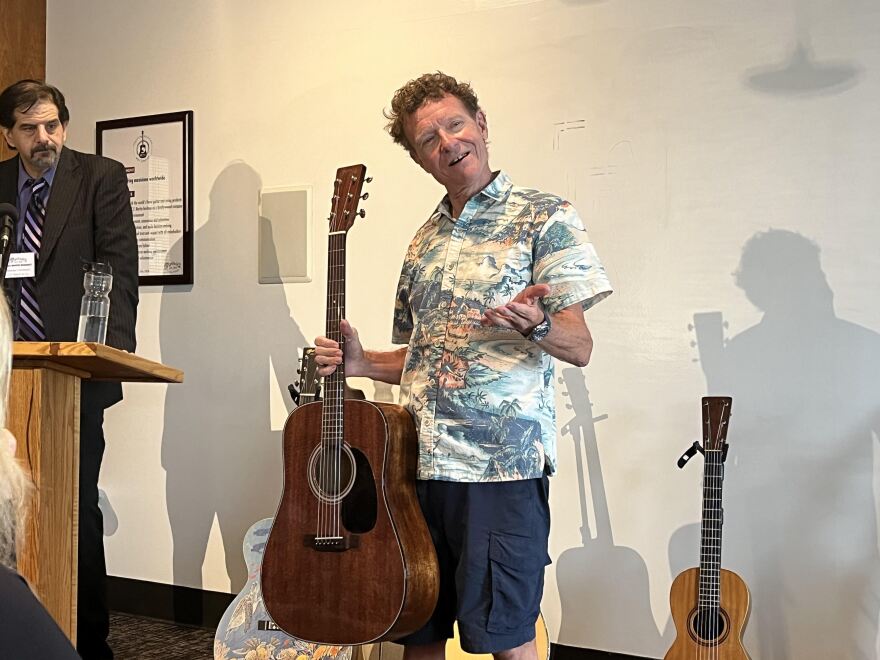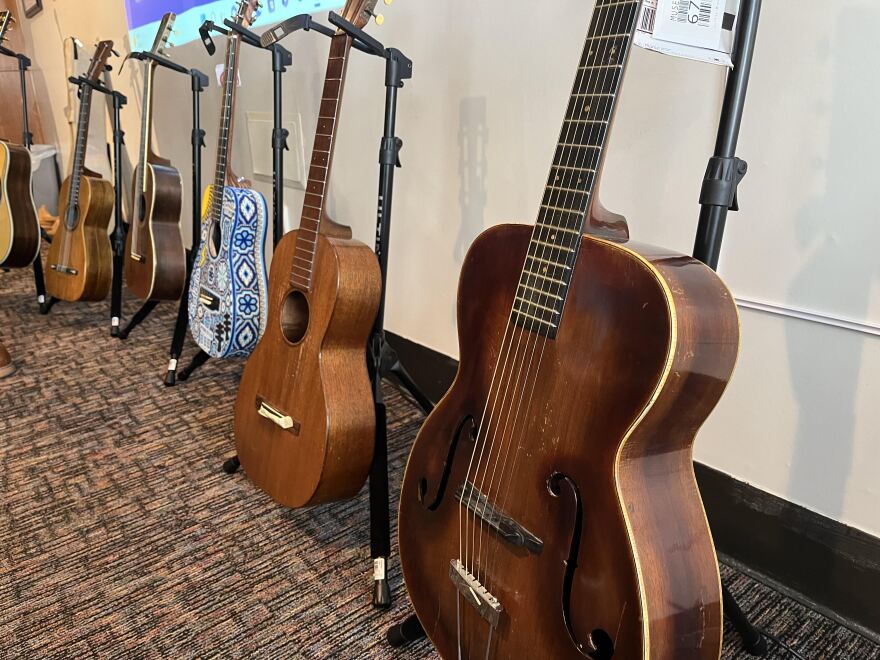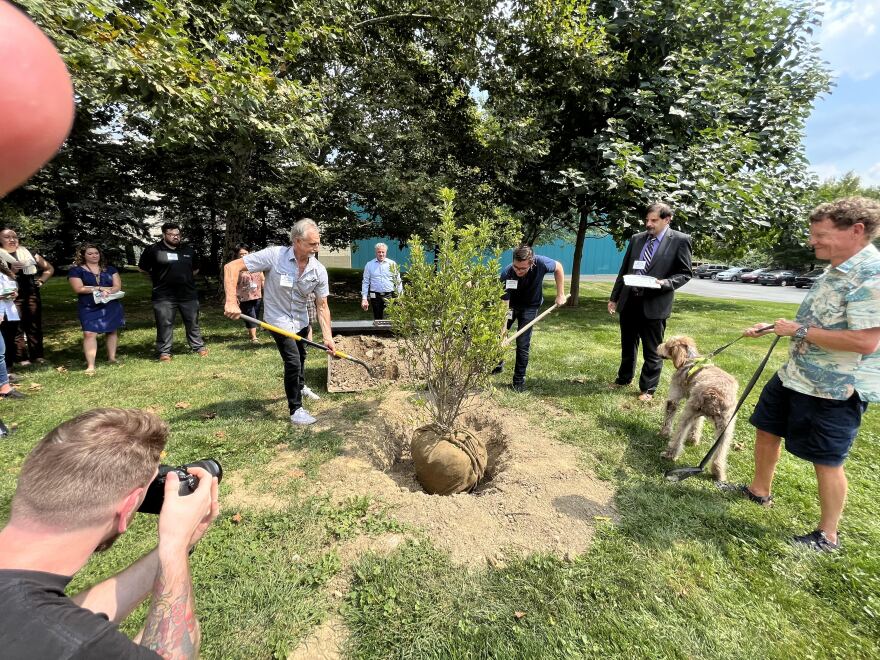- The eighth Martin's Guitar Wood Summit was held Thursday afternoon
- The main topic centered on sustainability of forests that provide the wood for guitars
- Martin & Co. is among the leaders in helping extend the life of the forests
NAZARETH, Pa. — The tree is young — a sapling. Slim and strong and, given proper care, with many years to grow.
It's the type of magnolia that one day will bloom large, colorful, fragrant flowers, the kind that had set the late Diane Martin’s heart a flutter.
During a break Thursday afternoon at the eighth Martin’s Guitar Wood Summit at Martin & Co. guitar factory in Nazareth, they gathered to plant the tree in memory of Martin.
“Part of why we get together here is to talk about how we can most judiciously utilize these precious rare woods that we (Martin and Co.) are known for."Chris Martin, executive chairman, Martin and Co.
A former Northampton County Judge and wife of Martin Executive Chairman Chris Martin IV, she died last year at 63, after a 10-year battle with breast cancer.
The message of planting and caring for a tree in Martin’s memory echoed the central message of the conference — to draw attention to the global issue of tree sustainability.

“Part of why we get together here is to talk about how we can most judiciously utilize these precious rare woods that we [Martin & Co.] are known for,” said Chris Martin, 68.
“You know, I’m not trying to be selfish or arrogant, but I actually think one of the highest and best uses of a mature tree is a guitar. It’s because the guitar will endure and give people pleasure.
"Take firewood: it keeps you warm, but then it’s gone, and then the woods are gone. The guitar lasts.”
Urgency to address deforestation
The day-long conference included environmental organizations such as Forest Stewardship Council, Preferred by Nature and ForestBased Solutions.
Their mission is to identify issues with deforestation and exploration around the world. Nearly half the world’s original forests have disappeared.
More than 200 tree species are used to make the instruments, 70 of them are threatened in the wild.Data from C.F. Martin & Co. conference
In 1990, C. F. Martin & Co. became one of the first guitar manufacturers to develop an ecological policy — one that advocated the use of sustainable and alternative woods, opposed the burning of tropical forests to create farmland, and favored legislation to control overharvesting of old-growth timber.
Martin & Co.’s focus on the environment and sustainable forests began long ago. In the 1960s, then-Martin Chief Executive Officer C.F. Martin III spoke of the importance of sustainable wood supplies.
The scarcity of Brazilian rosewood caused the company to transition to East Indian rosewood in 1969, and concern regarding the slaughter of elephants caused it to phase out ivory nuts and saddles in the 1970s.
The urgency to address deforestation and its impact on the environment and companies such as Martin guitar is stunning.
More than 200 tree species are used to make the instruments, 70 of them are threatened in the wild.

'We must keep value in the forests'
“Forests are under threat from habitat loss, conversion for agriculture, climate change, fuel wood and other things,” said Rob Garner, director of ForestBased Solutions.
It’s becoming difficult to procure high-grade wood for these instruments. Tonewood species are the most valuable timber in the world, but it’s very vulnerable. And it takes 80-to-150 years for those to mature.Rob Garner, director of ForestBased Solutions
“It’s becoming difficult to procure high-grade wood for these instruments. Tonewood species are the most valuable timber in the world, but it’s very vulnerable. And it takes 80-to-150 years for those to mature.
“We must keep value in the forests. We need to promote investment in forests and market-based conservation."
Among the ways Martin & Co. has been at the forefront of helping with forest sustainability is the implementation of four-piece guitar tops into the product line. That reduces the number of old-growth trees needed to make the instrument.
Another strategy is Martin’s using reclaimed and salvaged spruce that reduces the number of harvested spruce trees, trees salvaged from the forest floor, and wood reclaimed from assembling barges and bridges that were constructed from spruce logs.
'Talking about alternatives'
In an attempt to extend the life of those trees used to manufacture his guitars, Martin is a proponent of using alternate materials. They include plastics, Fiberglass, carbon fiber, metal, Lucite and high-pressure laminates.
“My feeling is, let’s socialize the alternatives to get our customers used to the fact that they work,” Martin said. “And over time, if the traditional wood becomes ever scarcer, we have this.”
“As Rob said, it’s not imminent."Martin Executive Chairman Chris Martin IV
Conversely, Garner said he believes reforestation is the solution to sustaining the trees needed for guitar construction.
“As Rob said, it’s not imminent,” Martin said. “But I’m just talking about alternatives.”
If there is an overriding message to be gleaned from the conference, it is that Martin & Co. is taking action regarding the foresting issue.
In Pennsylvania, the company has planted tens of thousands of trees in the wildlands conservatory, as well as planting trees around the world where it gets wood for their guitars.
“We absolutely understand we need to all take action now,” Martin Chief Executive Officer Thomas Ripsam said.
“We’re bringing people together — different parties, regulators, suppliers — to raise awareness. Also, we do this to discuss how we can accelerate some of the things and drive the impact faster.
"We need to do this for the climate, for us, and the future for our children.”


